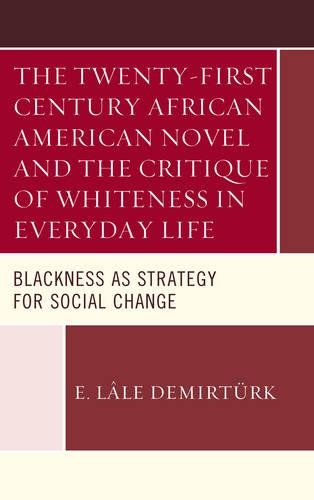
The Twenty-first Century African American Novel and the Critique of Whiteness in Everyday Life: Blackness as Strategy for Social Change
(Paperback)
Available Formats
Publishing Details
The Twenty-first Century African American Novel and the Critique of Whiteness in Everyday Life: Blackness as Strategy for Social Change
By (Author) E. Lle Demirtrk
Bloomsbury Publishing PLC
Lexington Books
11th September 2017
United States
Classifications
Professional and Scholarly
Non Fiction
Ethnic groups and multicultural studies
813.60989607
Physical Properties
Paperback
314
Width 151mm, Height 229mm, Spine 23mm
472g
Description
This book examines the post-9/11 African American novels, developing a new critical discourse on everyday discursive practices of whiteness. The critique of everyday life in the racial context of post-9/11 American society is important in considering diverse forms of the lived experiences and subjectivities of black people in the novels. They help us see that African American representations of the city have political significance in that the neo-urban novel explores the possibility of a black dialogic communication to build a transformative social change. Since the real power of Whiteness lies in its discursive power, the book reveals the urgency to understand not only how whiteness works in everyday life in American society. But it also explores how to cultivate new possibilities of configuring and performing Blackness differently, as a response to the post-9/11 configurations of the culture of fear, to produce new ways of interactional social relations that can eventually open up the space of critical awareness for white people to work against rather than reinforce discursive practices of White supremacy in everyday life. This book explores how the multiple subjectivities and transformative acts of blackness can offer ways of subverting the discursive power of the white embodied practices. What defines post-9/11 America as a nation that is consumed by the fear of racialized terrorists is its roots in the fear of (uncontrollable) Blackness as excess and ominous threat in the domestic terrain through which the ideology of White supremacy has constructed for governing through Whiteness. African-American urban novels published in the twenty-first century respond to the discursive power of normative Whiteness that regulates black bodies, selves and lives. This book demonstrates how black people contest white dominant social spaces as sites of black criminality and exclusion in an attempt to re-signify them as the sites of black transformative change through personal and grassroots activism through their performativity of Blackness as an agential identity formation in their interpersonal urban social encounters with white people. Hence, the vulnerable spaces of Whiteness in interracial urban encounters, as it pervasively addresses those moments of transformative change, enacted by Black characters, in the face of the discursive practices of whiteness in the everyday life. These novels celebrate multifarious representations of black individuals, who are capable of using their agency to subvert White discursive power, in finding ways in their personal and grassroots activism to transform the culture of fear that locates Blackness as such in an attempt to make a difference in the American society at large.
Reviews
Written within the historical context of 9/11 and the subsequent Iraq war and the war-on-terror, Obama and the post-racial society, the killing of young unarmed black males, and the re-emergence of the ideology of Whiteness, E. Lle Demirtrks The Twenty-First Century African American Novel and the Critique of Whiteness in Everyday Life examines seven novels by African Americans published after 2000. These individual analyses/readings are first-rate. Effectively using Critical Whiteness studies and other current social and literary theories, Professor Demirtrk locates and reads meaning in the cracks, seams, margins and the unconscious of these texts, thereby breathing new and innovative life into them. -- W. Lawrence Hogue, John and Rebecca Moores Distinguished Professor of English at the University of Houston and author of "Postmodernism, Traditional Cultural Forms, and African American Narratives"
In this new book that creates a fissure at the ontological core of whiteness and underscores the humanity and agency of Black people, E. Lle Demirtrk engages a critical literary corpus by African American novelists who not only understand the urgency that Black lives matter, but who also bear witness to the complexity of everyday Black ontology that dares to lay claim to its own self-understanding in the face of insidious operations of whiteness. Demirtrk's text underscores the interiority of Black existence as a testimonial ground for laying claim to Black agency, the risks of Black vulnerability, and the gifts of Black epistemology. In doing so, she renders visible the fragility of whiteness. For those who refuse the seductions of a 'post-racial' America, which is contested by the literary Black counter-gaze, Demirtrk's new text is a must read. -- George Yancy, professor of philosophy, Emory University
Author Bio
E. Lle Demirtrk is professor of American literature in the Department of American Culture and Literature at Bilkent University.
